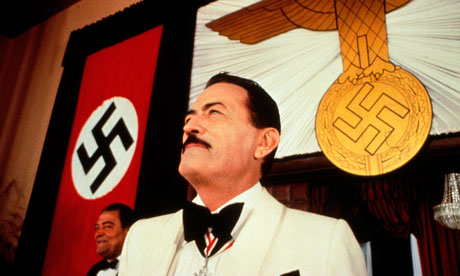
 I never go to bed alone. Most nights, I have more company than I know what to do with: my husband, our dog and our two cats on the bed make for a slumber in which everyone coordinates turning over like vegetables grilling on kabobs. When my husband isn't home at bedtime, I don't allow myself to pine for human companionship. I'm not picky; male or female will do. It probably won't surprise you, fellow mystery fans, when I say there are few bed partners better than a murderer. Here are some of my recent enjoyable one- or two-night stands.
I never go to bed alone. Most nights, I have more company than I know what to do with: my husband, our dog and our two cats on the bed make for a slumber in which everyone coordinates turning over like vegetables grilling on kabobs. When my husband isn't home at bedtime, I don't allow myself to pine for human companionship. I'm not picky; male or female will do. It probably won't surprise you, fellow mystery fans, when I say there are few bed partners better than a murderer. Here are some of my recent enjoyable one- or two-night stands.Doreen Corder begins The Pew Group by Anthony Oliver on the wrong foot. Hers, against her husband Rupert's instep at the top of the stairs. Moments later, he's in a heap, head askew, at the staircase bottom, dead as the parsley on your plate. (She doesn't consider it murder because it was a spur-of-the-moment thing. He wanted whiskey and sex while she wanted an hour of show-jumping on TV. We'll let her take a mulligan on calling it murder.) Antique shop owner Rupert doesn't leave Doreen very well off, but she managed to pick up enough knowledge watching him run his business to give it a go on her own. In fact, Rupert's barely cold before Doreen scores a coup: a pew group, an extremely rare piece of English pottery worth "a king's ransom" comes into her possession.
Everyone in the Suffolk town of Flaxfield wants to get their hands on it and before long it's missing from the cupboard of Doreen's shop. Who took it? There's no lack of credible suspects and Flaxfield has gone on the boil. There are strange happenings in the woods at night, someone disappears and everyone is looking for the missing pew group. Looking over their shoulders are Doreen's mother Mrs. Lizzie Thomas, who has moved to Flaxfield from Cardiff to keep an eye on Doreen, whom she considers flighty, lazy and mean, and Inspector John Webber, who has returned to his hometown while on medical leave from his London job.
This is a very engaging traditional mystery. It sparkles with unique characters living their eccentric lives in a picturesque part of England. The unusual relationships that they develop with each other make this book special. The cheerful and nosy Mrs. Thomas finds Webber attractive but the two are friends and comrades in sleuthing rather than lovers. Oliver's writing is not only ribald and witty, he also gives some interesting information about the antiques trade and the obsessional collectors who support it. It's the perfect read when you're looking for a book that's neither mind-numbing action/dripping bodily fluids nor the blandest of comfort food. Unfortunately, Oliver only wrote four mysteries in the Lizzie Thomas/John Webber series (The Pew Group is the first) but they're all good for some entertaining hours in the sack.
"How sharper than a serpent's tooth it is to have a thankless child." Those are King Lear's words but Edward Powell's aunt in Richard Hull's The Murder of My Aunt would agree with them. Since the death of Edward's parents she has used family money, which Edward will inherit upon her death, to support him at her home in Llwll, Wales. Edward detests Wales and would like to live in London but this is impossible because he was kicked out of school for outlandish behavior and he has no skills. His narcissistic personality renders him unemployable. Edward spends his days reading racy French novels, spoiling his Pekinese So So and engaging in a battle of wills with his aunt.
Edward's aunt is determined to teach him to be a better person and he is determined not to be taught. After a particularly bad day in which he runs out of gas on his way to Llwll he decides to kill her. Luckily for his aunt and the reader, although he is sharper than a serpent's tooth, his mind is less than razor sharp, and he must try, try, and try again to kill her. [Georgette and Jonas Oldacre, this book might be for you.]
The Murder of My Aunt was written in 1934 and is a classic of mystery fiction. It regularly appears on lists of 100 best mysteries ever written. Edward's petulance and self-serving explanations make a very entertaining narration. The battle between Edward and his aunt is a fascinating study of narcissism and an unhealthy symbiotic relationship. Hull's writing is ironic and literate and if you haven't yet read his book you have a pleasure in store for you.
Three men walk into a Japanese restaurant in São Paulo, Brazil. (I swear this isn't the beginning of a joke. I'm going to tell you about Ira Levin's brilliant 1976 thriller, The Boys from Brazil.) Two are bulky men in dark suits and the third is an older, slimmer man dressed in white who insists on paying for the private dining room adjacent to the room he'd already reserved. When the two other men go over the two rooms inch by inch and then assume the position of guards outside the room, the reader knows something is up.
 |
| Gregory Peck as Dr. Josef Mengele |
 |
| Laurence Olivier as Ezra Lieberman |
The six assassins aren't the only ones who hear the plot. A young American gets wind of it and calls world-renowned Nazi hunter Yakov Liebermann (based on real-life Simon Wiesenthal, name changed to Ezra Lieberman in the movie The Boys from Brazil), who hears only that 94 men in several countries will die at the hands of the Nazis. He must figure out who, where and why in order to know how to stop it. Liebermann isn't the man he used to be and he knows he can't go to the authorities with this snippet of unproven information. He's old and frail and his sources in government and media have retired or died. Liebermann still lectures but to much smaller audiences at synagogues and colleges. The world's attention has moved on to other things.
The Boys from Brazil was written 35 years ago but it remains a stunning thriller all the same. Levin's pacing and plotting are impeccable. The story alternates between the jungles of Brazil with Mengele, and Europe and the United States with Liebermann. Levin, who also wrote Rosemary's Baby, The Stepford Wives, and A Kiss Before Dying, is a master of suspense. Disregard any voices in your head telling you you don't need to read this book. Don't read anything more about the plot. Levin has more tricks up his sleeve than you think and he'll keep you awake all night until you finish. The next night, you can watch the movie based on Levin's book, starring Gregory Peck, Laurence Olivier and James Mason.
One of Celia Fremlin's publishers once exulted that she was such an expert in domestic psychological suspense that her reader can sense the diapers drying on the line while reading. And it's true. She sets her books among middle- or working-class English families and then lets them walk into a nightmare step by terrible step. Fremlin's eye and ear for the every-day worries of women--what their families will eat for dinner, whether they should worry when Susan isn't home by midnight, what Mrs. Jones across the road will think when Robert runs the babysitter home at 2 a.m.--are unparalleled in mystery fiction. That she then takes these normal worries and magnifies them into something truly frightening is her gift to psychological suspense.
In Fremlin's 1969 book Possession, Clare Erskine is thrilled when her 19-year-old daughter Sarah announces that she is engaged to be married to accountant Mervyn Redmayne. Yes, he is 31 years old but, as Clare tells her husband, they're lucky he has a real job and hasn't joined a firm of psychedelic accountants or quit to do something artistic or take drugs. Sarah's previous boyfriends took advantage of her generous heart and loyalty but here is a man who will safely remove Sarah from their clutches. Clare is not pleased when her younger daughter is adamantly opposed to Sarah's engagement. Even worse, Clare's best friend Peggy reports that Mervyn's mother, Mrs. Redmayne, is an overly possessive mother who will cause no end of problems for Sarah. Clare tries to balance faith in her daughter's good sense and desire to be independent with her worries about Sarah's future. And Mervyn and Mrs. Redmayne give Clare something to worry about.

I don't want to say any more about the plot of this book but I will tell you that Possession had me breathing through my mouth and leaning away from the bed's headboard while reading it. If you're looking for suspense in a literary mystery rather than a page-turning popcorn read, this book is for you. I opened the book when I crawled into bed and then finished it before the cows came home.

I don't want to say any more about the plot of this book but I will tell you that Possession had me breathing through my mouth and leaning away from the bed's headboard while reading it. If you're looking for suspense in a literary mystery rather than a page-turning popcorn read, this book is for you. I opened the book when I crawled into bed and then finished it before the cows came home.










I always go to bed with a book. In fact, I have the bad habit of having to start a new one if I happen to finish a book before falling asleep. Makes for some long nights! I went to bed with a cross-genre, historical/mystery/horror read last night, The Edinburgh Dead by Brian Ruckley. I'm enjoying it, but am only about halfway through at the moment.
ReplyDeleteSome of my favorite mystery authors to go to bed with include RJ Ellory (I absolutely loved A Quiet Belief in Angels), Sue Grafton (her Kinsey Millhone books are always great and I can't wait to get to her latest this fall), Lisa Lutz's hilarious Spellman books are another favorite of mine for nighttime reading.
In terms of suspense, Harlan Coben and Jt Ellison definitely keep me up at night. SJ Bolton's latest, Now You See Me, was a recent favorite and Mo Hayder makes me keep the lights on!
I've gotta check out "Possession" -- thanks for that. I just finished Laura Lippman's latest. It's a fascinating story -- the way she uses point of view. It's a surprisingly quiet story, literary you might say, but it kept me hooked.
ReplyDeleteI second the recommendations of The Pew Group and The Boys From Brazil. Never heard of Possession or The Murder of My Aunt before now, but you make them sound irresistible.
ReplyDeleteLisa, is The Most Dangerous Thing the Laura Lippman you're talking about? I just started hearing about it.
Becky, S. J. Bolton seems to have a lot of fans. We're planning to have a guest review of Now You See Me on Saturday.
I also enjoyed Oliver's The Pew Group and Levin's The Boys from Brazil. It's been years since I read them, and it was a treat to read about them here. I re-read Hull's The Death of My Aunt this summer and loved it.
ReplyDeleteThat particular Celia Fremlin is a good, anxiety-ridden read, and I liked the portraits she paints of parents dealing with their college-aged children in 1969. Her adults struggle to fit into their own peer groups and try to launch their children into the world while worrying about them as they do it. I liked her Uncle Paul, The Spider-Orchid, With No Crying, and The Long Shadow even more than Possession. I'm trying to think of another author who concentrates on the terrors involved in every-day life to the extent that Fremlin does. One of the questions raised in her books is when do you reasonably hit the panic button? We don't like to make an unnecessary fuss and embarrass ourselves or other people.
Becky, I like Sue Grafton's Kinsey Milhone, too. The books are formulaic, but they're well done, and Kinsey is such an appealing character.
Lisa, thanks for your thoughts about Laura Lippman's latest. I've been hearing a lot about it recently.
Hi Della,
ReplyDeleteI love the first photo on your Sept. 21 post with the pooch in the middle, it's a great.
Susie